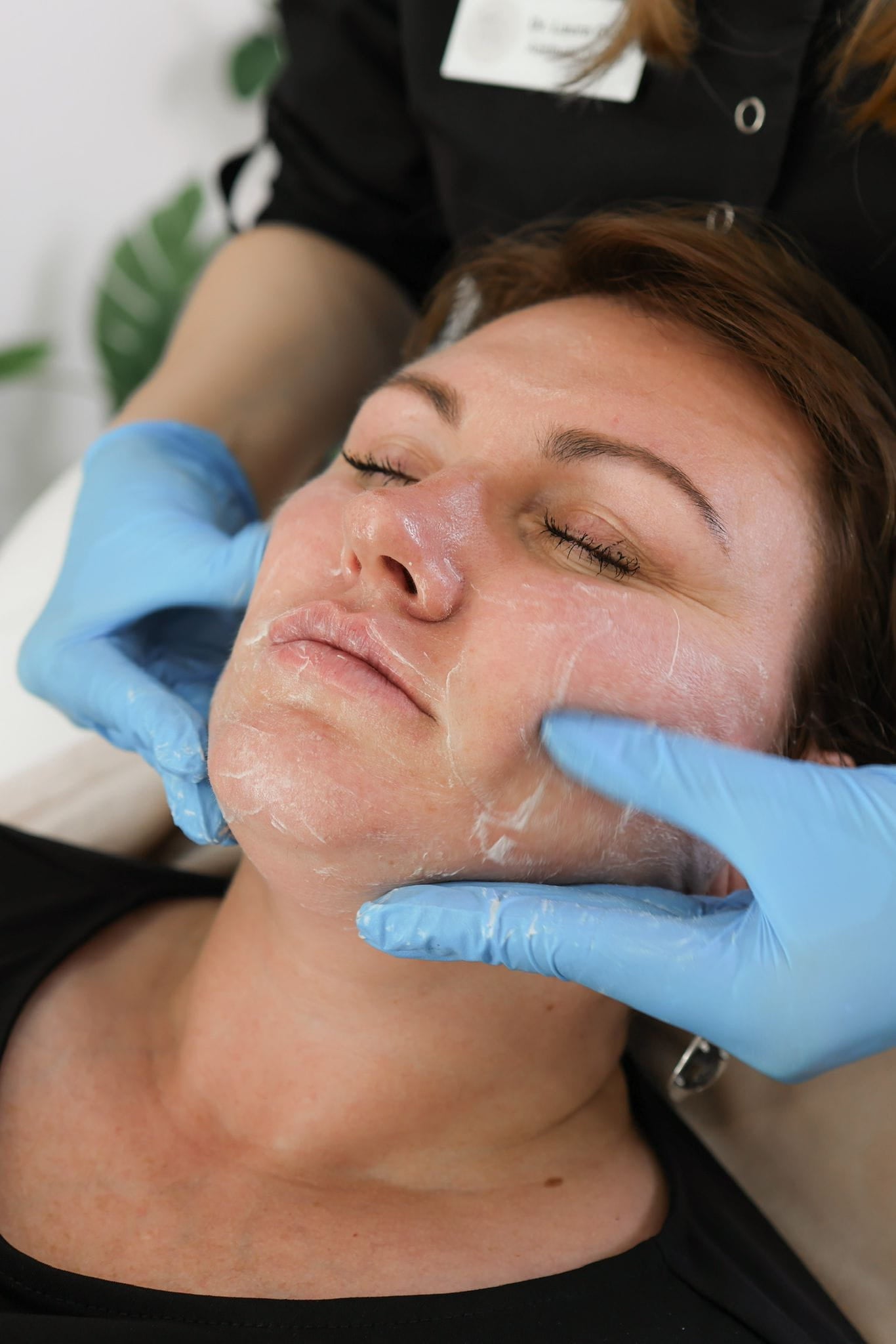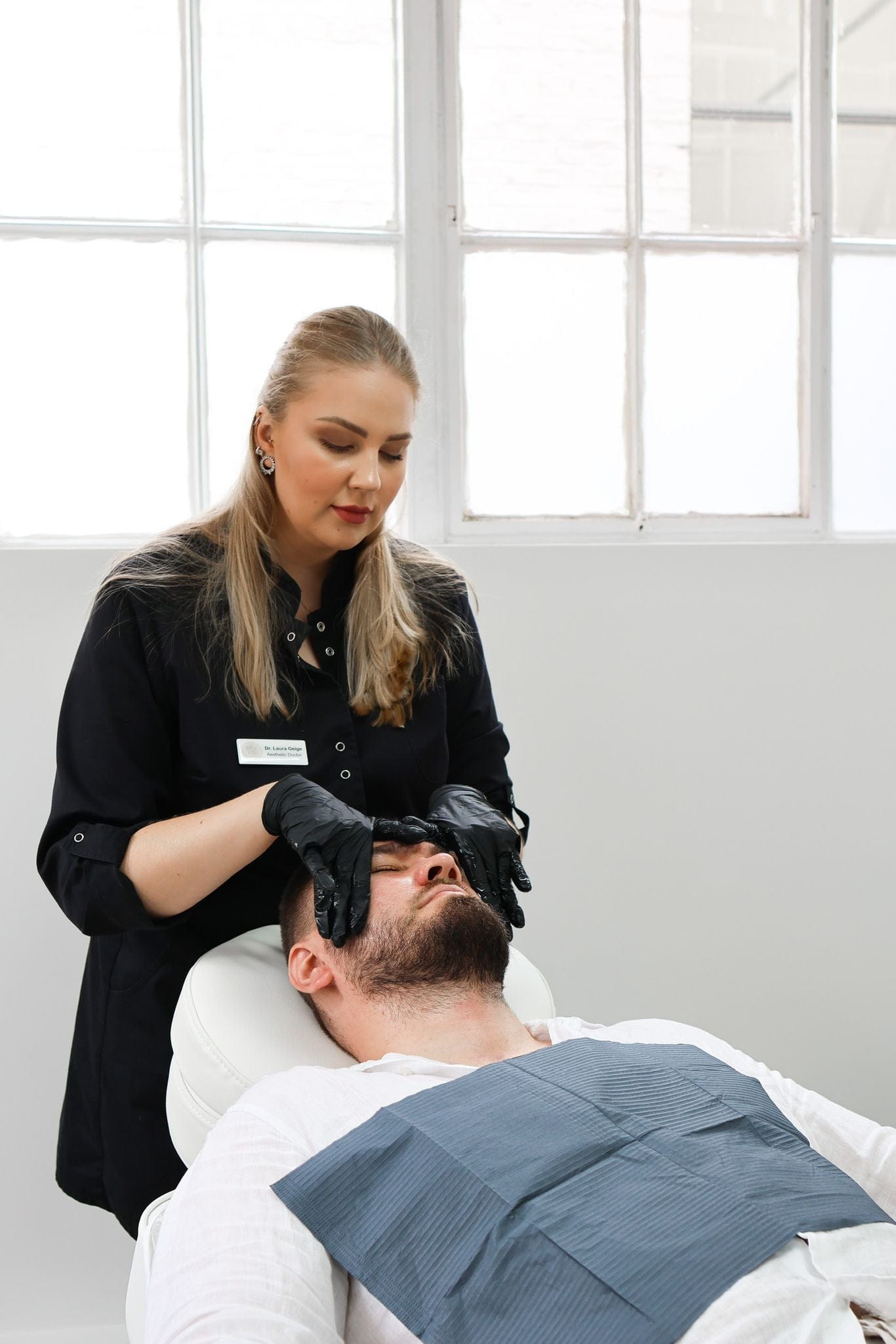Cosmelan Depigmentation Peel & Darker Skin Tones
Cosmelan, a popular depigmentation peel known for its effectiveness in treating hyperpigmentation, has sparked debate regarding its suitability for individuals with darker skin tones. This article aims to explore the safety and efficacy of Cosmelan treatments for darker skin tones within the UK context, examining potential risks and benefits while highlighting expert recommendations and user experiences.
Mechanism of Action
Cosmelan Depigmentation Peel utilizes a potent combination of ingredients that work synergistically to target hyperpigmentation. Its primary mechanism of action involves inhibiting tyrosinase, the enzyme responsible for melanin production.
The active ingredients in Cosmelan primarily achieve this through several mechanisms:
-
Tyrosinase Inhibition:
Cosmelan contains kojic acid and azelaic acid, both potent inhibitors of tyrosinase. By suppressing this enzyme’s activity, the production of melanin is significantly reduced. - Cellular Turnover Stimulation: Ingredients like tretinoin promote cell turnover, shedding pigmented cells and revealing brighter skin underneath.
- Antioxidant Protection: Cosmelan incorporates antioxidants such as niacinamide and vitamin C. These protect against free radical damage that can contribute to pigmentation issues.
The effectiveness of Cosmelan for darker skin tones is a matter of ongoing discussion and requires careful consideration.
Benefits for Darker Skin Tones
While Cosmelan has shown promise in treating hyperpigmentation across various skin tones, its application on darker skin requires extra caution. The risk of post-inflammatory hyperpigmentation (PIH), where the skin becomes darker after inflammation or injury, is higher in individuals with darker complexions.
However, when performed correctly by a qualified and experienced dermatologist, Cosmelan can be beneficial for darker skin tones. A skilled practitioner will tailor the treatment protocol to minimize risks and maximize benefits. This may involve using a milder concentration of the peel or adjusting the application time.
The potential benefits of Cosmelan for darker skin tones include:
- Reduced appearance of melasma, post-inflammatory hyperpigmentation, sun spots, and other forms of hyperpigmentation.
- Improved skin tone and texture.
- A more even complexion.
It’s crucial for individuals with darker skin tones considering Cosmelan treatment to:
- Consult a dermatologist with experience treating darker skin.
- Discuss their medical history, including any previous skin treatments or sensitivities.
- Follow post-treatment instructions meticulously to minimize the risk of complications.
Potential Risks and Side Effects
Cosmelan Depigmentation Peel can be used on darker skin tones, but it requires extra caution due to the increased risk of post-inflammatory hyperpigmentation (PIH).
While Cosmelan is effective in treating various types of pigmentation, its use on darker skin needs careful consideration and expertise. A qualified dermatologist with experience treating darker skin tones will be able to assess individual skin type and concerns, adjust treatment protocols accordingly, and minimize potential risks.
Potential side effects can include redness, irritation, peeling, and temporary darkening of the skin. It’s important for individuals considering Cosmelan treatment on darker skin tones to understand these potential risks and benefits, and to follow all post-treatment instructions carefully to ensure optimal results and minimize complications.
Case Studies and Testimonials
Cosmelan Depigmentation Peel is a popular treatment for hyperpigmentation, but its use on darker skin tones requires careful consideration. While it can be effective, there’s an increased risk of post-inflammatory hyperpigmentation (PIH), where the skin becomes darker after inflammation.
It’s essential to consult a dermatologist experienced in treating darker skin tones. They will assess your individual skin type and concerns to determine if Cosmelan is suitable and tailor the treatment protocol accordingly.
Potential risks include redness, irritation, peeling, and temporary darkening of the skin. Thorough post-treatment instructions are crucial for minimizing complications and ensuring optimal results.
Testimonials and case studies can offer insights into individual experiences with Cosmelan on darker skin tones. However, it’s important to remember that results vary based on factors like skin type, severity of hyperpigmentation, and adherence to treatment recommendations.

Ultimately, making an informed decision about using Cosmelan requires a thorough consultation with a qualified dermatologist who can assess your individual needs and guide you through the process safely and effectively.
Consultation and Assessment
Cosmelan Depigmentation Peel utilizes a potent blend of ingredients to target hyperpigmentation. Its active components work in several ways: inhibiting tyrosinase, the enzyme responsible for melanin production; stimulating cell turnover to shed pigmented cells; and providing antioxidant protection against free radical damage.
While effective on various skin tones, Cosmelan’s application on darker skin requires extra caution due to a higher risk of post-inflammatory hyperpigmentation (PIH). When performed correctly by an experienced dermatologist, it can be beneficial for individuals with darker skin tones.
Potential benefits include reduced appearance of melasma, sun spots, and other pigmentation concerns, along with improved skin tone and texture.
Individuals considering Cosmelan should consult a dermatologist experienced in treating darker skin tones to assess their suitability and tailor the treatment protocol accordingly.
Potential side effects like redness, irritation, peeling, and temporary darkening of the skin are possible. Following post-treatment instructions meticulously is crucial for minimizing complications and achieving optimal results.
Testimonials and case studies can offer insights into individual experiences, but remember that results vary based on skin type, pigmentation severity, and treatment adherence.

Ultimately, a thorough consultation with a qualified dermatologist is essential to make an informed decision about Cosmelan treatment for darker skin tones.
Recommendations from Dermatologists in the UK
Cosmelan Depigmentation Peel utilizes a potent blend of ingredients to target hyperpigmentation. Its active components work in several ways: inhibiting tyrosinase, the enzyme responsible for melanin production; stimulating cell turnover to shed pigmented cells; and providing antioxidant protection against free radical damage.
While effective on various skin tones, Cosmelan’s application on darker skin requires extra caution due to a higher risk of post-inflammatory hyperpigmentation (PIH). When performed correctly by an experienced dermatologist, it can be beneficial for individuals with darker skin tones. Potential benefits include reduced appearance of melasma, sun spots, and other pigmentation concerns, along with improved skin tone and texture.
Individuals considering Cosmelan should consult a dermatologist experienced in treating darker skin tones to assess their suitability and tailor the treatment protocol accordingly. Potential side effects like redness, irritation, peeling, and temporary darkening of the skin are possible. Following post-treatment instructions meticulously is crucial for minimizing complications and achieving optimal results.
Testimonials and case studies can offer insights into individual experiences, but remember that results vary based on skin type, pigmentation severity, and treatment adherence.
Ultimately, a thorough consultation with a qualified dermatologist is essential to make an informed decision about Cosmelan treatment for darker skin tones.
Aftercare and Maintenance
Aftercare and maintenance are crucial components of achieving optimal results from any cosmetic treatment, including Cosmelan Depigmentation Peel. Following your dermatologist’s post-treatment instructions meticulously will help minimize the risk of complications and promote healing.
Sun Protection Measures
Sun protection is paramount for individuals who have undergone Cosmelan treatment. The skin is more sensitive to sun damage during the recovery period, and prolonged sun exposure can lead to discoloration, fading of results, or even post-inflammatory hyperpigmentation (PIH).
It is essential to apply a broad-spectrum sunscreen with an SPF of 30 or higher every day, even on cloudy days. Reapply every two hours, especially after sweating or swimming.
In addition to sunscreen, other sun protection measures should be incorporated:
- Minimize direct sun exposure during peak hours (10 am to 4 pm).
- Seek shade whenever possible.
- Wear protective clothing like hats and long sleeves.
Product Recommendations
Aftercare and maintenance are crucial components of achieving optimal results from any cosmetic treatment, including Cosmelan Depigmentation Peel. Following your dermatologist’s post-treatment instructions meticulously will help minimize the risk of complications and promote healing.
Sun protection is paramount for individuals who have undergone Cosmelan treatment. The skin is more sensitive to sun damage during the recovery period, and prolonged sun exposure can lead to discoloration, fading of results, or even post-inflammatory hyperpigmentation (PIH).
It is essential to apply a broad-spectrum sunscreen with an SPF of 30 or higher every day, even on cloudy days. Reapply every two hours, especially after sweating or swimming.
In addition to sunscreen, other sun protection measures should be incorporated:
- Minimize direct sun exposure during peak hours (10 am to 4 pm).
- Seek shade whenever possible.
- Wear protective clothing like hats and long sleeves.
Moisturizing is also important after Cosmelan treatment to help hydrate the skin and promote healing. Choose a gentle, fragrance-free moisturizer suitable for your skin type.
Avoid using harsh skincare products, exfoliants, or retinoids during the recovery period as they can irritate the skin and hinder healing.
Be patient and consistent with your aftercare routine. It may take several weeks to see the full effects of the treatment.
Long-Term Results and Expectations
Aftercare and maintenance are crucial components of achieving optimal results from any cosmetic treatment, including Cosmelan Depigmentation Peel. Following your dermatologist’s post-treatment instructions meticulously will help minimize the risk of complications and promote healing.
Sun protection is paramount for individuals who have undergone Cosmelan treatment. The skin is more sensitive to sun damage during the recovery period, and prolonged sun exposure can lead to discoloration, fading of results, or even post-inflammatory hyperpigmentation (PIH).
It is essential to apply a broad-spectrum sunscreen with an SPF of 30 or higher every day, even on cloudy days. Reapply every two hours, especially after sweating or swimming.
- Minimize direct sun exposure during peak hours (10 am to 4 pm).
- Seek shade whenever possible.
- Wear protective clothing like hats and long sleeves.
Moisturizing is also important after Cosmelan treatment to help hydrate the skin and promote healing. Choose a gentle, fragrance-free moisturizer suitable for your skin type.
Avoid using harsh skincare products, exfoliants, or retinoids during the recovery period as they can irritate the skin and hinder healing.
Be patient and consistent with your aftercare routine. It may take several weeks to see the full effects of the treatment.
Long-term results and expectations from Cosmelan Depigmentation Peel vary depending on individual factors like skin type, severity of pigmentation, and adherence to post-treatment instructions.
- With consistent sun protection and continued skincare maintenance, Cosmelan can provide lasting improvement in the appearance of melasma, sun spots, and other types of hyperpigmentation.
- However, it’s important to note that pigmentation may reappear over time if sun exposure is not carefully managed or new triggers for pigmentation arise.
- Regular touch-up treatments may be necessary to maintain optimal results. Your dermatologist can advise on the appropriate frequency of touch-ups based on your individual needs.
Legal Considerations and Regulations in the UK
Legal considerations and regulations surrounding cosmetic procedures, including depigmentation peels like Cosmelan, are governed by a combination of national and local laws in the UK. These regulations primarily focus on ensuring patient safety, ethical practice, and qualified practitioners.
The General Medical Council (GMC) sets standards for medical practitioners, including dermatologists, who perform cosmetic procedures. Dermatologists must adhere to ethical guidelines and obtain informed consent from patients before any treatment.
Additionally, the UK has a regulatory body called the Care Quality Commission (CQC) that inspects healthcare providers, including clinics offering cosmetic treatments, to ensure they meet certain quality standards.
The Advertising Standards Authority (ASA) regulates advertising claims made by clinics and practitioners regarding cosmetic procedures. They aim to prevent misleading or false advertising about treatment effectiveness or safety.
Specific regulations regarding Cosmelan may exist at a local level, so it is important for individuals seeking this treatment to research the requirements in their area and ensure the clinic they choose is licensed and operates within legal boundaries.
- Gummy Smile Treatment – Gum Contouring Near Ranmore, Surrey - September 29, 2025
- Fine Lines And Wrinkles Treatment In Milford, Surrey - September 27, 2025
- Downturned Smile Treatment Near Wallington, Surrey - September 25, 2025
